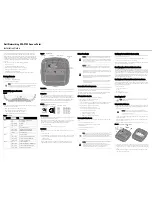
Copyright © 2016 Alarm.com
|
www.alarm.com
|
v1.0
3
NetworX Verizon LTE Module
|
Installation Guide
Radio Status LEDs
There are five small radio status LEDs, located on the bottom of the module
(see
Figure 1
). T
able 4
below describes the LED functions.
Table 4: LED Functions
LED
Function
L1
Error LED. Flashes 1 to 8 times in an 8-second interval to indicate
specific error. See
Table 5
for errors and common fixes.
L2
Panel Communication and Z-Wave status messages. Flashes every
time the module communicates with the panel and flashes in
patterns to indicate Z-Wave status.
L3
LTE Communication. Flashes every time the LTE signal level is
checked and when packets are exchanged with Alarm.com.
L4
LTE Signal Level. Flashes 0 to 5 times to indicate signal strength, or
toggles on/off slowly when communicating with Alarm.com servers.
L5
Z-Wave Error LED. See
Table 6
for error descriptions.
LED Details
LED L1 (red)
L1 flashes when there is an error. The number of flashes indicates the error
number. If there are two or more errors at the same time, the errors will
flash one after the other. The LED will stay off for at least four seconds
between errors.
Table 5: Errors flashed on L1 (red)
Number of
flashes
Error and solution
1
Module cannot communicate with the panel. Perform a power
cycle on the panel. If the error persists lift the module out of
the panel and re-insert it. If the error is still observed try a
different module. Finally, if that does not fix the problem try a
different panel.
2 then 4
The module provisioning process could not be completed.
2 then 5
The module provisioning process could not be completed
because the module is currently roaming on the carrier’s
network.
3
The module is trying to register on the LTE network. If it
persists for more than a few minutes, the module is having
problems registering with the LTE network. Check L4 for signal
level. If signal level is lower than 2 “bars”, change the panel’s
location or use a remote antenna option. If the signal is good,
the module may be roaming on a LTE network that does not
partner with our LTE providers.
4
The module is registered on the LTE network but cannot
connect with Alarm.com. Contact Alarm.com Technical
Support.
5
Radio portion of the module is not working correctly. If this
persists for more than a few minutes the module may need to
be replaced. This error is extremely rare so verify that the
module is flashing 5 times.
6
This is an error only if it persists for more than a minute.
Otherwise, it’s just an indication that the module is fixing an
unusual condition regarding communication with the LTE
network.
7
There are bit sets in Location 21 that prevent Alarm.com from
getting the sensor list from the panel. In Location 21, segment
1, if bits 5 and 6 are set the module can not retrieve the sensor
list. Note that bit 7 will prevent location 21 from being
displayed at the keypad. Bits 5, 6 and 7 can only be set via the
Downloader program.
This could also mean that the module is not compatible with
the current panel type.
8
If it persists, the account may have been set up incorrectly.
Contact Alarm.com Technical Support. You will be asked to
check the serial number of the module.
LED L2 (yellow)
L2 flashes with every communication between the module and the panel.
Normal pattern calls for a series of quick flashes every two seconds in Idle
Mode or four seconds in PowerSave Mode. It also occasionally flashes in
patterns to indicate Z-Wave status. See
Table 6
for a description of various
possibilities.
Table 6: Z-wave LED status indicators
LED 2
LED 5
Device status or error
Description
4-blink
Add Mode (lasts 120
seconds or until a device
is added)
In this mode you can add a
device to the local Z-Wave
network. Devices cannot be
added to a network if they
are already a part of a
network
2-blink
Delete Mode (lasts 120
seconds or until a device
is deleted)
In this mode you can delete a
device from a Z-Wave
network. A device can only
be in one network at a time,
and must receive a “delete”
command before it can be
learned into a new network
Solid
Successful add
node/remove
node/replication (lasts
60 seconds)
After receiving this signal
leave all devices by the LTE
module for 1 minute. Locks
must be left next to the
module for 4 minutes
Solid
with
one
blink
Add node attempt failed
because node already in
network (lasts 60
seconds)
Device you attempted to add
to a network is already in a
network, and must be
“deleted” before it can join a
new network
2-blink
No other nodes are in
the network (lasts until a
device is added to the
network)
No devices have been added
that can be controlled by the
LTE module yet. See above
for instructions on how to
add devices
5-blink
Learn mode error (lasts
60 seconds)
The device was not
successfully added to the Z-
Wave network.
6-blink
No Home ID present
(lasts until the module
connects to Alarm.com
and is configured)
When the LTE module first
connects to Alarm.com it is
configured with a necessary
unique network ID
LED L3 (yellow)
L3 flashes with every communication between the module and its radio unit
in Idle Mode, and with every communication with Alarm.com in Connected
Mode. In PowerSave Mode, this LED flashes in unison with LED 2.























